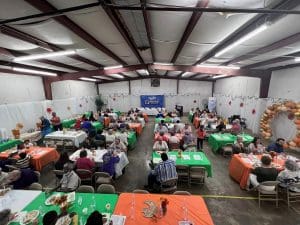Individual Benefits of Community Engagement Explored in New Research

By Jack Schlotter
In research from her new book Faith and Community: How Engagement Strengthens Members, Places of Worship, and Society, Dr. Rebecca Glazier, Professor of Political Science in the School of Public Affairs at the University of Arkansas at Little Rock and Director of the Little Rock Congregations Study, explores the impact that community involvement has on the lives of people of faith.

Dr. Glazier’s findings revealed a direct, positive relationship between involvement in the community and happiness in everyday life. Statistical models reveal a nearly ten-point increase in life satisfaction associated with those who are engaged and involved in their community: “what this looks like is a life satisfaction score of 71.8 at the lowest level of community engagement and 81.8 at the highest level of community engagement” Glazier writes in her forthcoming book.
Relatedly, Dr. Glazier notes the influence that having family involved in the community can have on one’s willingness to be involved as well: “Many volunteers mentioned a tradition of service passed down through their families. Continuing to be engaged in the community is part of carrying on that tradition and adds meaning and richness to their lives.” One participant in the research study, which has been ongoing in Little Rock since 2012, commented “When I see people less fortunate than I am, it makes me feel so blessed to be able to help them. My mom was like that.”

Additionally, the results of the research also show through statistical models that community involvement is related to numerous spiritual benefits. In particular, Dr. Glazier finds a correlation between community involvement and feeling closer to God. Clergy can play an important role here: hearing sermons encouraging community engagement has a similarly positive spiritual benefit. The individual benefits of community engagement are not limited to the spiritual realm; the research findings also note positive physical and mental health benefits related to increased community involvement.
Speaking with congregants about what motivated or inspired their involvement in the community, it was apparent that these members of the community felt a sense of personal benefit, but that they were also working to help others. One leader of a Homeless Ministry in Little Rock revealed that she felt compelled to help those who are less fortunate. Others have religious motivations for community engagement. A leader of a large Christian congregation told Dr. Glazier of a spiritual calling to engage the community: “It’s what reflects the heart and character of God; it’s what we see Jesus doing.”
Regardless of the reason to get involved, it is clear from this new research that there are substantial benefits for individuals that get involved in their community. Those who are looking for opportunities can check out several local resources and organizations such as the Arkansas Food Bank: https://arkansasfoodbank.org/, or Our House: https://ourhouseshelter.org/.
This article is the first in a series about the benefits of community engagement, based on the findings of new research in the forthcoming book, “Faith and Community: How Engagement Strengthens Members, Places of Worship, and Society” by Dr. Rebecca A. Glazier (Temple University Press, 2024). Future articles will detail how community engagement benefits congregations and democracy.
